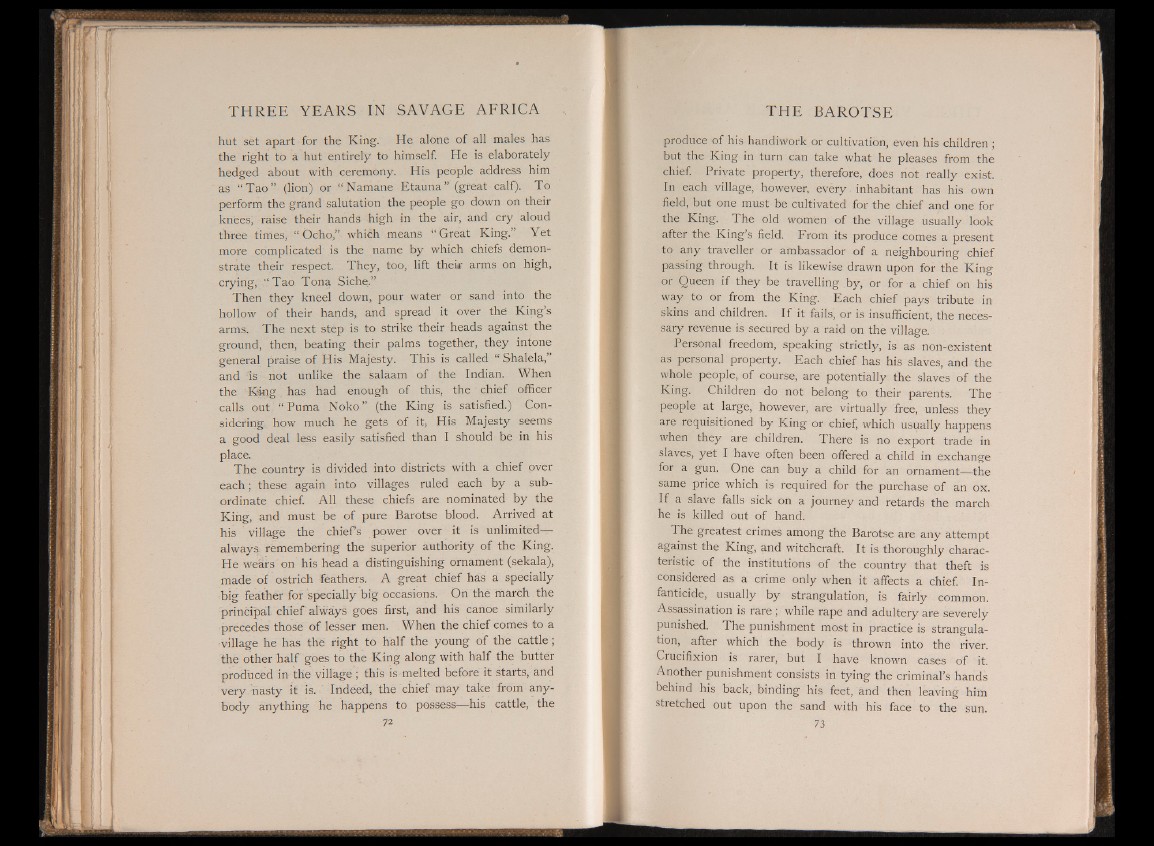
hut set apart for the King. He alone of all males has
the right to a hut entirely to himself. He is elaborately
hedged about with ceremony. His people address him
as “ Tao” (lion) or “ Namane Etauna” (great calf). To
perform the grand salutation the people go down on their
knees, raise their hands high in the air, and cry aloud
three times, “ Ocho,” which means “ Great King.” Y et
more complicated is the name by which chiefs demonstrate
their respect. They, too, lift thek arms on high,
crying, “ Tao Tona Siche.”
Then they kneel down, pour water or sand into the
hollow of their hands, and spread it over thé King’s
arms. The next step is to strike their heads against the
ground, then, beating their palms together, they intone
general praise of His Majesty. This is called “ Shalela,”
and is not unlike the salaam of the Indian. When
the King has had enough of this, the chief officer
calls out “ Puma Noko” (the King is satisfied.) Considering
how much he gets of it, His Majesty seems
a good deal less easily satisfied than I should be in his
place.
The country is divided into districts with a chief over
each ; these again into villages ruled each by a subordinate
chief. All these chiefs are nominated by the
King, and must be of pure Barotse blood. Arrived at
his village the chiefs power over it is unlimited«#*-
always remembering the superior authority of the King.
He wears on his head a distinguishing ornament (sekala),
made of ostrich feathers. A great chief has a specially
big feather for specially big occasions. On the march the
principal chief always goes first, and his canoe similarly
precedes those of lesser men. When the chief comes to a
village he has the right to half the young of the cattle ;
the other half goes to the King along with half the butter
produced in the village ; this is melted before it starts, and
very/nasty it is. Indeed, the chief may take from anybody
anything he happens to possess—his cattle, the
72
produce of his handiwork or cultivation, even his children ;
but the King in turn can take what he pleases from the
chief. Private property, therefore, does not really exist.
In each village, however, every inhabitant has his own
field, but one must be cultivated for the chief and one for
the King. The old women of the village usually look
after the King’s field. From its produce comes a present
to any traveller or ambassador of a neighbouring chief
passing through. It is likewise drawn upon for the King
or Queen if they be travelling by, or for a chief on his
way to or from the King. Each chief pays tribute in
skins and children. If it fails; or is insufficient, the necessary
revenue is secured by a raid on the village.
Personal freedom, speaking strictly, is as non-existent
as personal property. Each chief has his slaves, and the
whole people, of course, are potentially the slaves of the
King. Children do not belong to their parents. The
people at large, however, are virtually free, unless they
are requisitioned by King or chief, which usually happens
when they are children. There is no export trade in
slaves, yet I have often been offered a child in exchange
for a gun. One can buy a child for an ornament—the
same price which is required for the purchase of an ox.
If a slave falls sick on a journey and retards the march
he is killed out of hand.
The greatest crimes among the Barotse are any attempt
against the King, and witchcraft. It is thoroughly characteristic
of the institutions of the country that theft is
considered as a crime only when it affects a chief. Infanticide,
usually by strangulation, is fairly common.
Assassination is rare ; while rape and adultery are severely
punished. The punishment most in practice is strangulation,
after which the body is thrown into the river.
Crucifixion is rarer, but I have known cases of it.
Another punishment consists in tying the criminal’s hands
behind his back, binding his feet, and then leaving him
stretched out upon the sand with his face to the sun.
73